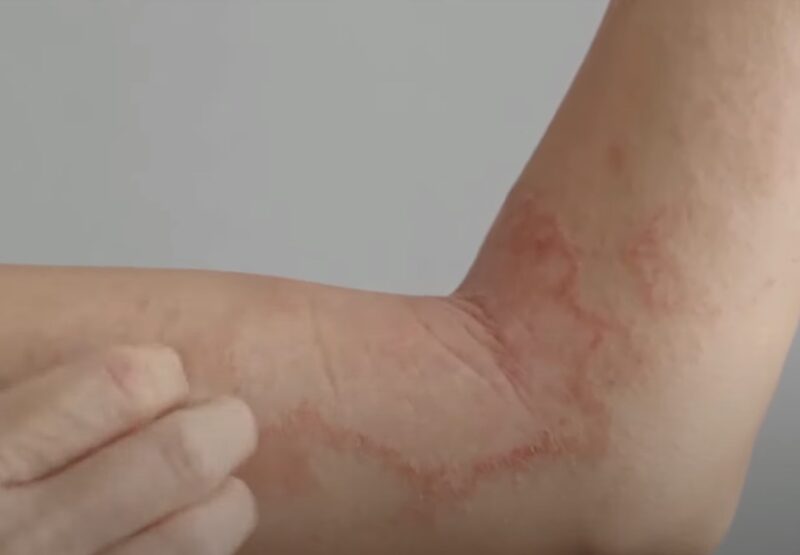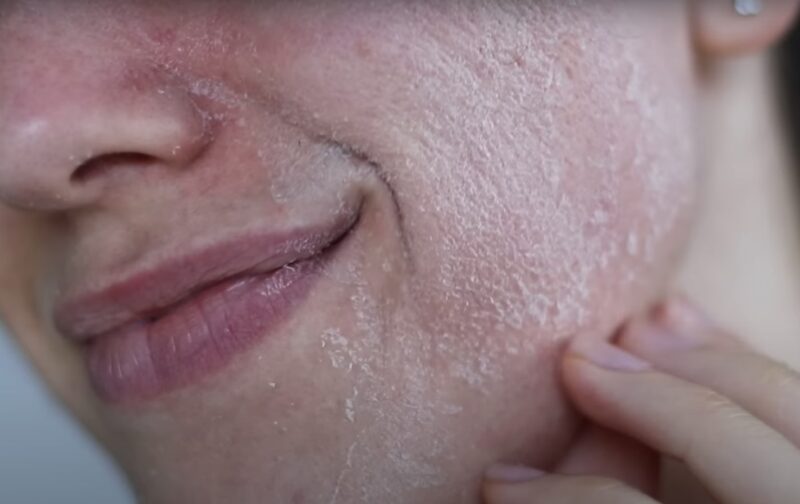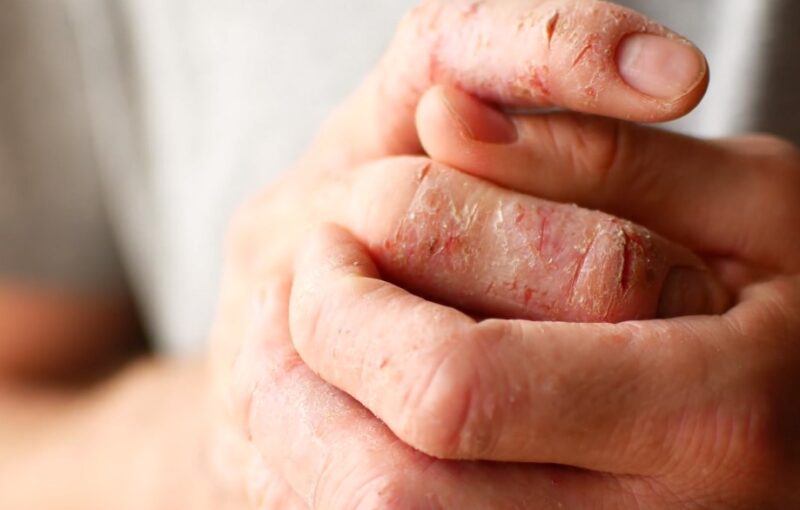Eczema and dry skin often present similar symptoms, such as itchiness and flakiness, leading to confusion about their true nature. However, significant distinctions exist between the two conditions.
Eczema, a chronic inflammatory skin disorder, can result in dry skin, but the reverse is not true; dry skin does not cause eczema. Various factors, including genetics, immune system responses, and environmental elements, play a role in triggering eczema.
On the other hand, dry skin typically arises from external causes like harsh soaps, scratchy fabrics, extreme temperatures, and changes in humidity or hormones.
Understanding the differences is crucial for effective management and treatment, which may range from simple moisturizers to more complex therapies such as prescription medications and alternative remedies. We will analyze this topic in the following sections.
Key Takeaways
Symptoms and Triggers of Eczema
Eczema, or atopic dermatitis, presents a range of symptoms that significantly affect individuals, characterized by an intense itch that can disrupt daily living and sleep. This condition is notorious for its red to brownish-gray patches, particularly on hands, feet, ankles, wrists, neck, upper chest, eyelids, inside the bends of elbows and knees, and in infants, the face and scalp.
Small, raised bumps that may leak fluid and crust over when scratched are common. Chronic scratching leads to thickened skin, known as lichenification, intensifying the itch. Keep in mind that redness can be a sign of some other issues, such as cellulitis, which means that you should never ignore the signs. Consulting a doctor is the best way to ensure proper treatment.
Itching and Rash
The primary symptom, an intense itch, often precedes the rash’s appearance, leading to a cycle of scratching that exacerbates the condition. The skin may become inflamed, dry, and susceptible to infection, complicating the condition further.
Genetic and Environmental Triggers
People with a family history of eczema, asthma, or hay fever are at an increased risk, pointing to a genetic link. Environmental triggers include a wide range of irritants such as soaps, detergents, and disinfectants, as well as allergens like dust mites, pets, pollens, and molds. These factors can strip the skin of natural oils or provoke allergic reactions, leading to eczema flare-ups.
Causes of Dry Skin
Dry skin, medically known as xerosis, can occur for various reasons, ranging from environmental factors to individual lifestyle choices. Unlike eczema, which is a chronic condition with a complex interplay of genetic and environmental triggers, dry skin is often a temporary condition that can be alleviated with proper care.
Environmental Factors
One of the primary causes of dry skin is exposure to environmental conditions that strip the skin of its natural moisture. This includes low humidity environments, especially during winter months when indoor heating can significantly reduce indoor humidity levels. Additionally, hot baths and showers, swimming in chlorinated water, and living in arid climates can exacerbate skin dryness.
- Low Humidity and Heating: During colder months, the use of indoor heating systems can lower humidity levels, making the air dry and leading to skin moisture loss.
- Hot Showers and Baths: Frequent hot showers or baths remove oils from the skin, reducing its natural moisture barrier.
- Chlorinated Pools and Arid Climates: Swimming in chlorinated water and residing in dry climates can further deplete the skin’s moisture.
Lifestyle Factors
The use of harsh soaps, detergents, and skincare products that contain alcohol can dry out the skin. Wearing clothing made of materials that irritate the skin, such as wool or synthetic fibers, can also contribute to dryness.
- Harsh Soaps and Skincare Products: Products that strip oil from the skin can exacerbate dryness, highlighting the importance of choosing mild, moisturizing options.
- Irritating Clothing Materials: Clothes made from harsh materials can irritate the skin, leading to dryness and discomfort.
Differences Between Eczema and Dry Skin

Eczema and dry skin, while sharing symptoms such as itchiness and flakiness, stem from different causes and exhibit distinct characteristics. Recognizing these differences is crucial for appropriate treatment and management.
Chronic Condition vs. Temporary Issue
Eczema, a chronic inflammatory skin condition, involves more than just surface-level dryness. It links closely with genetic factors and an overactive immune system response, leading to cycles of flare-ups and remissions. Dry skin, by contrast, often results from external environmental factors and usually resolves with proper skincare.
- Genetic Predisposition: Eczema often runs in families, suggesting a genetic component absent in common dry skin cases.
- Immune System Response: Eczema sufferers experience immune system overactivity, leading to inflammation, a feature not present in simple dry skin.
Symptoms and Severity
The symptoms of eczema extend beyond dryness to include severe itching, red or brownish patches, and possibly oozing or crusted sores from scratching. Dry skin typically manifests as a rough, scaly texture without the intense itch or inflammation associated with eczema.
- Itch and Inflammation: Eczema involves intense itching and inflammation, while dry skin primarily causes discomfort due to lack of moisture.
- Skin Texture Changes: Eczema can lead to thickened, leathery skin areas over time, a condition known as lichenification, which does not occur with merely dry skin.
Treatment for Eczema
Eczema requires a straightforward approach to treatment, focusing on reducing symptoms, preventing flare-ups, and protecting the skin barrier. The strategies include medical treatments and lifestyle adjustments to manage the condition effectively.
Medical Treatments
For those with eczema, a range of medical options exists to control symptoms and manage the condition.
- Topical Corticosteroids: Doctors often prescribe these to reduce skin inflammation and alleviate itching.
According to Carolyn Farnsworth: 68–70% of patients with eczema saw an improvement in their symptoms after 12 weeks of topical steroid treatment.
- Moisturizers: Daily application of moisturizers helps maintain skin hydration and barrier function, crucial for eczema management.
- Systemic Medications: In severe cases, oral or injectable medications that modulate the immune system may be necessary.
Habits and Home Remedies
Lifestyle modifications play a significant role in managing eczema and preventing flare-ups.
- Skin Care Routine: A gentle skin care routine, avoiding harsh soaps and applying moisturizer regularly, can significantly reduce symptoms.
- Trigger Avoidance: Identifying and avoiding personal eczema triggers, such as certain foods, stress, or allergens, helps prevent flare-ups.
How to Deal With Dry Skin?

Proper care and preventive measures can significantly alleviate dry skin, enhancing comfort and skin health.
Hydration
- Hydration: Increasing water intake helps maintain skin hydration from the inside out.
- Humidifiers: Using a humidifier in dry environments, especially during winter, adds moisture to the air, helping keep skin hydrated.
Bathing and Moisturizing
- Lukewarm Baths: Opt for short, lukewarm baths or showers to prevent stripping the skin of its natural oils.
- Moisturizing Immediately After Bathing: Apply a heavy moisturizer right after bathing to seal in moisture.
Choose the Right Skincare Products
- Fragrance-Free Products: Select skincare products without fragrances or alcohol to avoid skin irritation.
- Gentle Cleansers: Use mild cleansers that don’t foam excessively, as foaming agents can dry out the skin.
Alternative Remedies for Eczema
People looking for additional ways to manage eczema symptoms might find alternative remedies beneficial alongside conventional treatments. These options focus on natural ingredients, dietary changes, and stress management techniques to provide relief.
Natural Oils
- Coconut Oil: Applying coconut oil to the skin can soothe eczema due to its moisturizing and antibacterial properties.
- Sunflower Oil: This oil helps enhance the skin’s barrier function, offering protection against irritants and infections.
Herbal Treatments

- Aloe Vera: The gel from aloe vera plants is known for its healing and soothing properties, making it a popular choice for reducing eczema inflammation and itchiness.
- Witch Hazel: Often used for its anti-inflammatory properties, witch hazel can be applied to the skin to soothe irritation and reduce redness.
Proper Diet
- Omega-3 Fatty Acids: Foods rich in omega-3s, like fish, flaxseeds, and walnuts, may help reduce the inflammation associated with eczema.
- Probiotics: Consuming probiotic-rich foods such as yogurt, kefir, and sauerkraut can support gut health, which in turn may influence skin health and reduce eczema flare-ups.
Stress Reduction

- Yoga and Meditation: These practices can significantly lower stress levels, which is beneficial since stress can trigger or exacerbate eczema symptoms.
- Exercise: Regular physical activity boosts overall health and can help manage stress, potentially leading to fewer eczema outbreaks.
FAQs
What does eczema feel like when it starts?
Eczema can feel like dry, itchy and inflamed skin. You may also notice a rash, bumps, or thickened patches of skin on different parts of your body.
What clears up eczema?
Eczema can be managed by moisturizing regularly, avoiding triggers, and using medicated ointments or creams. Some people may also benefit from light therapy, anti-inflammatory foods, or topical immunomodulators.
Can you self diagnose eczema?
You can’t self diagnose eczema, as it may look similar to other skin conditions. You should see a health care provider or a dermatologist for a physical examination and tests to confirm your diagnosis.
Is it best to leave eczema alone?
No, it’s not best to leave eczema alone. Scratching or ignoring eczema can worsen your symptoms and lead to infections or complications. You should follow your treatment plan and seek medical help if your eczema flares up or doesn’t improve.
Last Words
To manage eczema and dry skin effectively, it’s crucial to consult a doctor for personalized advice. Combining medical treatments with daily care routines and exploring alternative remedies can lead to noticeable improvements. For people struggling with these conditions, finding the right approach means healthier, more comfortable skin.

